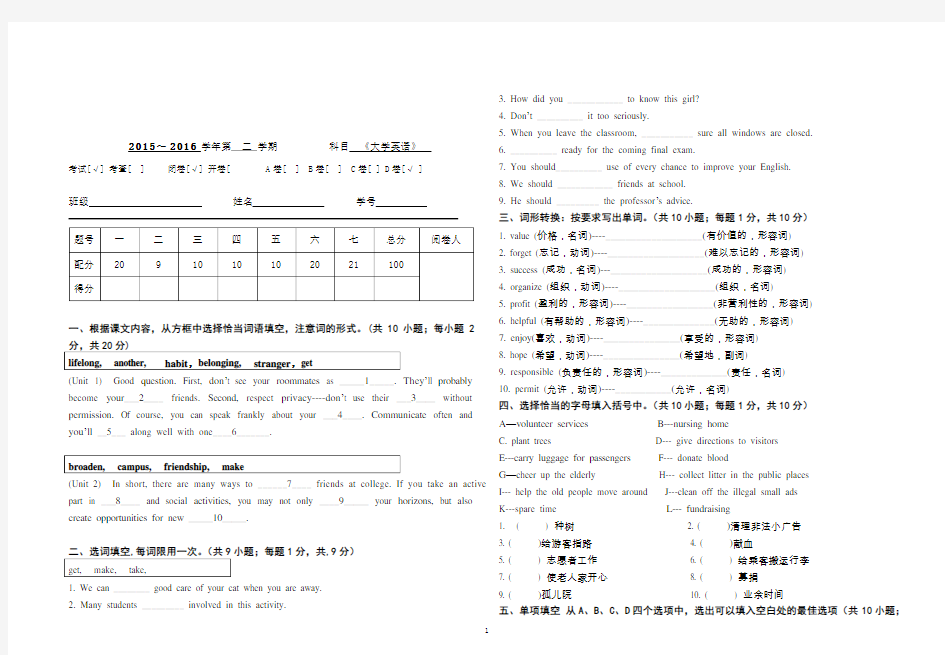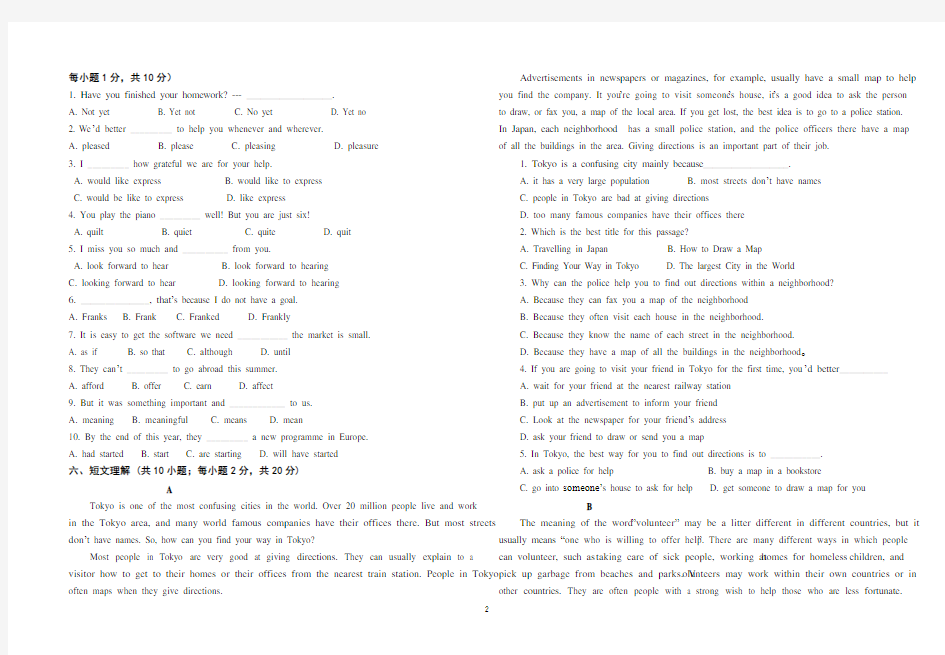

2015~2016学年第 二 学期 科目 《大学英语》
考试[√] 考查[ ] 闭卷[√] 开卷[ A 卷[ ] B 卷[ ] C 卷[ ] D 卷[√ ]
班级 姓名 学号
一、根据课文内容,从方框中选择恰当词语填空,注意词的形式。(共10小题;每小题2(Unit 1) Good question. First, don ’t see your roommates as _____1_____. They ’ll probably become your___2____ friends. Second, respect privacy----don ’t use their ___3____ without permission. Of course, you can speak frankly about your ___4____. Communicate often and you ’ll __5___ along well with one____6_______. (Unit 2) In short, there are many ways to ______7____ friends at college. If you take an active part in ___8____ and social activities, you may not only ____9_____ your horizons, but also create opportunities for new _____10_____.
小题;每题1分,共,9分) 1. We can ________ good care of your cat when you are away. 2. Many students _________ involved in this activity.
3. How did you ____________ to know this girl?
4. Don ’t __________ it too seriously.
5. When you leave the classroom, ___________ sure all windows are closed.
6. __________ ready for the coming final exam.
7. You should__________ use of every chance to improve your English. 8. We should ____________ friends at school. 9. He should _________ the professor ’s advice.
三、词形转换:按要求写出单词。(共10小题;每题1分,共10分) 1. value (价格,名词)----___________________(有价值的,形容词) 2. forget (忘记,动词)----___________________(难以忘记的,形容词) 3. success (成功,名词)---___________________(成功的,形容词) 4. organize (组织,动词)----___________________(组织,名词) 5. profit (盈利的,形容词)----_________________(非营利性的,形容词) 6. helpful (有帮助的,形容词)----______________(无助的,形容词) 7. enjoy(喜欢,动词)----_______________(享受的,形容词) 8. hope (希望,动词)----_______________(希望地,副词) 9. responsible (负责任的,形容词)----_____________(责任,名词) 10. permit (允许,动词)----___________(允许,名词)
四、选择恰当的字母填入括号中。(共10小题;每题1分,共10分) A —volunteer services B---nursing home
C. plant trees D--- give directions to visitors E---carry luggage for passengers F--- donate blood
G —cheer up the elderly H--- collect litter in the public places I--- help the old people move around J---clean off the illegal small ads K---spare time L--- fundraising
1. ( ) 种树
2. ( )清理非法小广告
3. ( )给游客指路
4. ( )献血
5. ( ) 志愿者工作
6. ( ) 给乘客搬运行李
7. ( ) 使老人家开心
8. ( ) 募捐
9. ( )孤儿院 10. ( ) 业余时间
五、单项填空 从A 、B 、C 、D 四个选项中,选出可以填入空白处的最佳选项(共10小题;
每小题1分,共10分)
1. Have you finished your homework? --- __________________.
A. Not yet
B. Yet not
C. No yet
D. Yet no
2. We’d better _________ to help you whenever and wherever.
A. pleased
B. please
C. pleasing
D. pleasure
3. I _________ how grateful we are for your help.
A. would like express
B. would like to express
C. would be like to express
D. like express
4. You play the piano _________ well! But you are just six!
A. quilt
B. quiet
C. quite
D. quit
5. I miss you so much and __________ from you.
A. look forward to hear
B. look forward to hearing
C. looking forward to hear
D. looking forward to hearing
6. ______________, that’s because I do not have a goal.
A. Franks
B. Frank
C. Franked
D. Frankly
7. It is easy to get the software we need ___________ the market is small.
A. as if
B. so that
C. although
D. until
8. They can’t _________ to go abroad this summer.
A. afford
B. offer
C. earn
D. affect
9. But it was something important and ____________ to us.
A. meaning
B. meaningful
C. means
D. mean
10. By the end of this year, they _________ a new programme in Europe.
A. had started
B. start
C. are starting
D. will have started
六、短文理解 (共10小题;每小题2分,共20分)
A
Tokyo is one of the most confusing cities in the world. Over 20 million people live and work in the Tokyo area, and many world famous companies have their offices there. But most streets don’t have names. So, how can you find your way in Tokyo?
Most people in Tokyo are very good at giving directions. They can usually explain to a visitor how to get to their homes or their offices from the nearest train station. People in Tokyo often maps when they give directions.
Advertisements in newspapers or magazines, for example, usually have a small map to help you find the company. It you’re going to visit someone’s house, it’s a good idea to ask the person to draw, or fax you, a map of the local area. If you get lost, the best idea is to go to a police station. In Japan, each neighborhood has a small police station, and the police officers there have a map of all the buildings in the area. Giving directions is an important part of their job.
1. Tokyo is a confusing city mainly because__________________.
A. it has a very large population
B. most streets don’t have names
C. people in Tokyo are bad at giving directions
D. too many famous companies have their offices there
2. Which is the best title for this passage?
A. Travelling in Japan
B. How to Draw a Map
C. Finding Your Way in Tokyo
D. The largest City in the World
3. Why can the police help you to find out directions within a neighborhood?
A. Because they can fax you a map of the neighborhood
B. Because they often visit each house in the neighborhood.
C. Because they know the name of each street in the neighborhood.
D. Because they have a map of all the buildings in the neighborhood。
4. If you are going to visit your friend in Tokyo for the first time, you’d better__________
A. wait for your friend at the nearest railway station
B. put up an advertisement to inform your friend
C. Look at the newspaper for your friend’s address
D. ask your friend to draw or send you a map
5. In Tokyo, the best way for you to find out directions is to ___________.
A. ask a police for help
B. buy a map in a bookstore
C. go into someone’s house to ask for help
D. get someone to draw a map for you
B
The meaning of the word ”volunteer” may be a litter different in different countries, but it usually means “one who is willing to offer help”. There are many different ways in which people can volunteer, such as taking care of sick people, working at homes for homeless children, and pick up garbage from beaches and parks. V olunteers may work within their own countries or in other countries. They are often people with a strong wish to help those who are less fortunate.
V olunteers don’t expect any kind of pay.
At the root of volunteering is the idea that one person may have the ability to offer services to help people. However, Tracy, a good friend of mine, recently came back from India with a new idea of what being a volunteer means. She worked for two and a half weeks in one of Mother Teresa’s homes in Calcutta. The following is her story.
“I first heard about Mother Teresa in my high school. We watched a video about her work in India and all over the world, I was so moved by her spirit to help others and her endless love for every human being that I wanted to try her kind of work after graduating from high school. So with two friends I flew to Calcutta and stayed there for a few weeks.”
“I was asked to work in a home for the sick people. I helped wash clothes and sheets, pass out lunch, etc. I also fed the people who were too weak to feed themselves and tried to cheer them up. But to be honest, I don’t think I was helping very much. It was then realized that I had not really come to help, but to learn about and experience another culture that helped improve my own understanding of life and the world.”
6. According to the passage, a volunteer refers to a person who_________
A. is willing to help those in need without being paid
B. can afford to travel to different places.
C. has a strong wish to be successful
D. offers services to the poor with minimum pay
7. Why did Tracy want to be a volunteer?
A. She liked to work with Mother Teresa.
B. She had already had some experience
C. She was invited by Mother Teresa.
D. She wanted to follow Mother Teresa’s example.
8. What moved Tracy is Mother Teresa’s lifelong efforts of giving others____________
A. medical care
B. financial help
C. endless love
D. professional aid
9. Why did Tracy say that she could not help much in Calcutta?
A. Because she didn’t help the sick people at all
B. Because she could not speak the local language
C. Because she worked there only for a short time
D. Because she got more than what she gave
10. What Tracy’s “new idea” of being a volunteer?
A. Going abroad to help the sick
B. Working in Mother Teresa’s home
C. Improving oneself through helping others
D. Doing simple things to help the poor
七、翻译:((共7小题;每小题3分,共21分))
1.大学生应对自己的行为负责。(be responsible for)
2. 这是提高交际能力的一种好方法。(It’s a good way to…)
3. 首先,参加学生社团会给你带来很多交友的机会。(to begin with)
4. 无论你选择哪门课程,你都要对它充满热情。(have a passion for…)
5. 这是我平生第一次独自出行。(It’s my first time to…)
6. First, don’t see your roommates as strangers.
7. I’m a vocational college students majoring in marketing.
2015~2016学年第二学期科目《大学英语》考试[√] 考查[ ] 闭卷[√] 开卷[ ] A卷[ ] B卷[ ] C卷[ ] D卷[√ ] 班级姓名学号
一、根据课文内容填空。(共10小题;每小题2分,共20分)
1._____________________
2._________________
3.____________________
4._____________________
5._________________
6.____________________
7._____________________ 8._________________ 9.____________________
10._____________________
二、选词填空,每词限用一次。(共9小题;每题1分。共9分)
1._____________________
2._________________
3.____________________
4._____________________
5._________________
6.____________________
7._____________________ 8._________________ 9.____________________
三、词形转换:按要求写出单词。(共10小题;每题1分,共10分)
1._____________________
2._________________
3.____________________
4._____________________
5._________________
6.____________________
7._____________________ 8._________________ 9.____________________
10.____________________ 四、选择合适的字母填入括号(共10小题;每小题1分,共10分。)
1. ( ) 种树
2. ( )清理非法小广告
3. ( )给游客指路
4. ( )献血
5. ( ) 志愿者工作
6. ( ) 给乘客搬运行李
7. ( ) 使老人家开心8. ( ) 募捐
9. ( )孤儿院
10. ( ) 业余时间
五、单项填空从A、B、C、D四个选项中,选出可以填入空白处的最佳选项(共10小题;
七、翻译:((共7小题;每小题3分,共21分))
1. ____________________________________________________________________
2. ____________________________________________________________________
3. ____________________________________________________________________
4. ____________________________________________________________________
5. ____________________________________________________________________
6. ____________________________________________________________________
7. ____________________________________________________________________
广州市交通技师学院
广州市交通高级技工学校
期末试卷答题卡
2015~2016学年第二学期科目《大学英语》
考试[√] 考查[ ] 闭卷[√] 开卷[ ] A卷[ ] B卷[ ] C卷[ ] D卷[√ ]
一、词汇:选择括号中的单词或者短语的正确形式填空。(共10小题;每小题2分,共20分)
1. strangers
2. lifelong
3. belongings
4. habits
5. get
6. another
7. make
8. campus
9. broaden 10. friendships
二、选词填空,每词限用一次。(共9小题;每题1分。共9分)
1. donate
2. plant
3. help
4. cheer
5. give
6. chat
7. clean
8. play
9. carry
三、词形转换:按要求写出单词。(共10小题;每题1分,共10分)
1. orphanage
2. valuable
3. unforgettable
4. successful
5. organization
6. non-profit
7. illegal
8. helpless
9. communication 10. permission
四、选择恰当的字母填入括号中。(共10小题;每题1分,共10分)
1. ( ) 种树
2. ( )清理非法小广告
3. ( )给游客指路
4. ( )献血
5. ( ) 志愿者工作
6. ( ) 给乘客搬运行李
7. ( ) 使老人家开心
8. ( ) 募捐
9. ( )孤儿院
10. ( ) 业余时间
五、单项填空从A、B、C、D四个选项中,选出可以填入空白处的最佳选项(共10小题;
七、翻译(共7小题;每小题3分,共21分)
1.College students should be responsible for their behaviors.
2.It’s a good way to improve communication skills.
3.To begin with, to join campus clubs brings you a lot of opportunities to make friends.
4.No matter what courses you choose, you should have a passion for them.
5.It’s my first time to travel alone.
6. 首先,不要把你的室友当成陌生人。
7. 我是一名职业院校的市场营销专业的学生。
广州市交通技师学院
广州市交通高级技工学校
期末试卷参考答案及评分标准